
|
Newsletter Diversity and Equal Opportunity
|
|
Für die deutschsprachige Version des Newsletters, bitte hier klicken. Dear readers:
Over the summer, the Equal Opportunity Office and the faculties’ decentralized equal opportunity representatives have been working hard towards the goals laid down in the new Equal Opportunity Plan. One of the goals is the development of faculty-specific equal opportunity plans, which aim to more clearly identify the individual faculties’ deficits and needs for action. To achieve this goal, each faculty has formed a working group whose task is to finalize its equal opportunity plan by March 2022. Below you can find more information on the new Equal Opportunity Plan 2021 – 2027.
With a kick-off workshop in June, the Bauhaus-Universität Weimar started the »Vielfalt gestalten« audit. The university also used the event to initiate the process of signing on to the »Charta der Vielfalt«. Once a member of the Charter, the university will be part of a network of organizations committed to promoting acceptance, appreciation and inclusion of diversity in the workplace.
During the kick-off workshop, four working groups were established on the topics of: personnel selection, support services and complaints management, diversity in teaching, as well as student-initiated bottom-up projects.
We cordially invite you to participate in the working groups and to help us shape a more diverse and inclusive university! The working groups are open to all members of the university, and it is possible to join at any time. On the homepage of the Diversity Department, you can find more information on the working groups as well as on how to get in touch with the working groups’ contact people. We are looking forward to your input! Also feel free to mark the date for our next university-wide audit workshop: 25 February 2022.
During the kick-off workshop, the topics of internationality and multilingualism became very prominent. We were also reminded that the Corona pandemic has presented unique challenges to many of our international students, PhD candidates and staff. While the pandemic situation has improved in Weimar and Germany overall, so that many residents could for the most part enjoy their summer, many other countries have experienced more serious and often more deadly pandemic waves. Many of our international students, PhD candidates, and staff had to experience the pandemic without the support of their loved ones at home (and vice versa) and had to observe from afar how the pandemic affected their home-countries and communities. They are in our thoughts.
Best regards,
Tina Meinhardt
Equal Opportunity Officer of the Bauhaus-Universität Weimar
Dr. Miriam Benteler
Diversity Officer of the Bauhaus-Universität Weimar
Equal Opportunity Advisor
Dr. Michael Wallner
Equal Opportunity and Diversity Advisor
Franziska Fritsch
Equal Opportunity Office Administration Christin Sirtl. Photo: Matthias Eckert.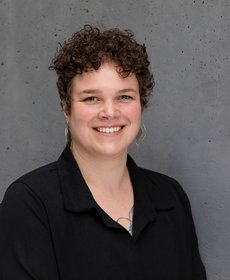 | During its 7 July 2021 plenary session, the Bauhaus Universität Weimar’s senate unanimously elected Christin Sirtl (scientific staff member at the professorship for Steel and Hybrid Structures, Faculty of Civil Engineering) as the university’s new Deputy Equal Opportunity Officer.
Since 2019, Christin Sirtl has been an elected member of the university’s Equal Opportunity Advisory Board as well as the decentralized equal opportunity representative of the Faculty of Civil Engineering. During her almost two-year term of office, she has accompanied numerous recruitment procedures and initiated a regular conversation group for women in the STEM field. Earlier this month, Sirtl and Prof. Ludwig co-chaired for the first time the faculty of Civil Engineering’s working group tasked with drafting an equal opportunity plan for the faculty. In her new position, Sirtl will continue to support the working group.
Susann Bähring, administrative staff member at the professorship for Construction Materials, will move up and fill Sirtl's vacated position as the Faculty of Civil Engineering's decentralized equal opportunity representative, in accordance with the 2019 representative election results and bylaws.
Sadly, the members of the Equal Opportunity Office and the Equal Opportunity Advisory Board must bid farewell to Ricarda Löser, PhD. For many years, Löser has successfully advocated for gender equality at the Bauhaus-Universität Weimar — as the university’s Equal Opportunity Officer, as the Faculty of Art and Design’s decentralized equal opportunity representative, and, most recently, as the university’s Deputy Equal Opportunity Officer. We thank her for her great commitment and her contributions to the Bauhaus-Universität Weimar and wish her all the best for her future. Denise Blickhan (Photo: Denise Blickhan).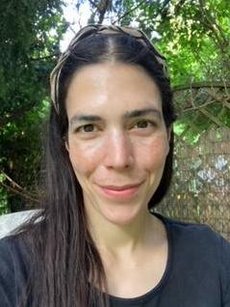 | In Juli 2021, Denise Blickhan (Studiengang Freie Kunst, Fakultät Kunst und Gestaltung) was elected as one of two Student Representatives to the Bauhaus-Universität Weimar's Equal Opportunity Advisory Board. Starting in October 2021, she will be serving as a contact person for students from all faculties on the topic of gender equality in research and teaching. She will also act as a spokesperson for students, bringing their suggestions and criticism to the Equal Opportunities Advisory Board.
We are pleased to introduce Denise Blickhan with a short interview here. ... was passed by the university senate.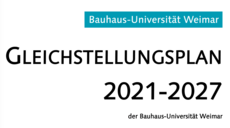 | During its 7 April 2021 plenary session, the university senate unanimously passed the Bauhaus Universität Weimar’s new Equal Opportunity Plan for the years 2021 to 2027. Thus, the strategic direction of the university’s equal opportunity efforts has been set for the next six years. The plan presents statistic data and formulates goals and measures.
Through the new Equal Opportunity Plan 2021 – 2027, the university representatives committed to shaping a gender-equitable university and research culture. This goal is based on the insight that excellence in the arts and sciences benefits from a multiplicity of perspectives and diversity among staff and students. In the upcoming years, all members of the university are encouraged to practice critical introspection so as to align their actions more closely with the goal of gender equality and to take responsibility for the common task of gender mainstreaming.
The plan focuses on quantitative (increasing the percentage of women or men in areas where they are underrepresented according to Thuringian Higher Education Act) as well as qualitative goals. Besides the explicit goal of the advancement of women, it also promotes the stronger anchoring of decentralized equal opportunity work in the faculties, the building up of gender expertise in the area of personnel selection and development, the expansion of family-friendly conditions of work and study, gender-sensitive research and teaching, diversity-sensitive gender equality work, as well as the prevention of sexist discrimination and sexual harassment or assault. Logo of the TKG. © TKG.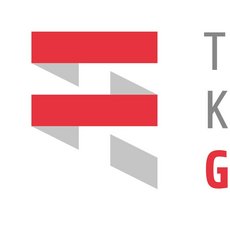 | Since 2018, the Thuringian Competence Center for Equal Opportunities (TKG) has been awarding the »Diversity Meets Science« prize to make the wide range of gender and diversity perspectives in research visible at Thuringian universities and to promote young researchers and scientists.
The TKG invites applications from: Graduates of all disciplines from Thuringian universities, whose final thesis (bachelor, master, diploma, state examination, or doctoral thesis) takes a gender/diversity perspective and was submitted within the last two years (i.e., since 1 August 2019).
The »Diversity Meets Science« prize is endowed with 2.000,-€. Application deadline is 27 August 2021.
For more information about the prize and application procedures, please visit the TKG’s website. Logo of the Federal Ministry of Education and Research (BMBF). © BMBF. | Scientific studies have shown that research which takes into account only one sex/gender will often result in incomplete or distorted findings. To ensure that research and development across all disciplines will consider gender aspects when appropriate, the Federal Ministry of Education and Research (BMBF) has issued new funding guidelines titled: »Geschlechteraspekte im Blick« (»Focus on Gender Aspects«).
Along with the new funding guidelines, the BMBF will provide funding for »innovative structural projects with model character that integrate gender aspects into the research process in a systematic and sustained manner — for excellence in research, science and innovation.« There will be two funding phases: a concept phase (of up to seven months) and an implementation phase (of up to five years). Qualified applicants are universities, extra-university research institutions, as well as small and medium-sized commercial enterprises engaged in research.
The application deadline for projects in the conceptual phase is 15 October 2021. Here you can find more information. Photo: Brooke Cagle (unsplash.com). | »What is it like to be a woman in engineering, or more generally in male-dominated courses of study or spheres of work?« — »How do power-relations play out in social constellations with unequal gender-relations?« — »Does sex/gender still matter in educational or professional settings at all?«
Already four times, female STEM students from various faculties came together over the summer term to discuss these questions and many more. During this loose series of meetings, the wish arose to create a more regular format for the exchange of ideas. Thus, starting in October, there will be a monthly discussion group, where women in the STEM field can exchange their thoughts and experiences. The exact details (location, dates/times, program) are currently being planned. If you’d like to stay up to date, if you have any questions or suggestions, or if you’d like to join the listserv, please feel free to drop an e-mail to organizer Christin Sirtl (christin.sirtl@remove-this.uni-weimar.de). We also recommend that you keep your eyes peeled in early October when surfing the Bauhaus-Universität Weimar’s Message Board or the Equal Opportunity Office’s website. Photo: Prateek Katyal (@prateekkatyal; unsplash.com)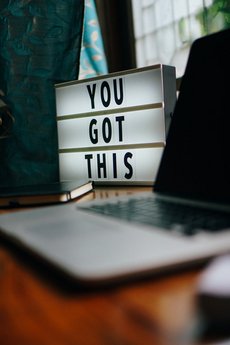 | On 7 and 9 September 2021, from 9:30 AM to 1:30 PM, the Equal Opportunity Office and the Bauhaus Research School are presenting a work-life-balance workshop for female academics affiliated with the Bauhaus-Universität Weimar.
In this workshop, participants will consider their various personal and professional roles and how to balance these demands. Through self-reflection, individual exercises, and group exchange, the workshop will guide participants through an assessment of their personal values and priorities, and help them build a plan to integrate their personal and professional goals and responsibilities. Moreover, the workshop will introduce strategies of resilience to help participants adapt to the stress of managing a successful career in research and handling the demands of multiple roles with changing responsibilities.
Síofra McSherry will teach the workshop in English. The number of participants is limited to 12 people. Female academics working at the Bauhaus-Universität Weimar can register here by 25 August 2021. Square outside the university library. Photo: Candy Welz | On 13 and 14 September 2021, both days from 10am to 2pm (incl. breaks), the Equal Opportunity Office offers a professional development program on committee work for women in academia.
Critical awareness of one’s own gendered position is a basic requirement for women who want to be seen as »competent« in their interactions with others. Behaving in stereotypical ways can have positive as well as negative consequences. In two consecutive workshops, Dr. Iris Koall will share empirical knowledges that can help participants to better understand gender images and hierarchies that play out across the different spheres of academic life. To enable them to present themselves and their concerns and demands more effectively, participants will also learn to analyze communicative, interactive, and micro-political processes of committee work with respect to gender—for instance, the goal-oriented use of networks, or the formation of alliances and exclusions.
The workshop series is taught in German. The number of participants is limited to 8 women. If you’d like to register for the two consecutive workshops, please send an email to: michael.wallner@remove-this.uni-weimar.de. Registration deadline is 31 August 2021. Photo: Isaiah Rustad (@isaiahrustad; unsplash.com) | According to §12 of Germany’s Anti-Discrimination Law (AGG), every organization is required to take appropriate measures to prevent sexual harassment in the workplace.
For this reason, on 24 September 2021, from 10am to 1:15pm, the Equal Opportunity Office offers a workshop on how to deal with sexual violence and harassment at the Bauhaus-Universität Weimar. It addresses the following questions:
What counts as sexual harassment in the workplace (incl. facts and numbers)? What are causes and consequences of sexual harassment in the workplace? What are the rights and responsibilities of people who have experienced sexual violence or harassment? What possible actions can equal opportunity officers take? How does one best proceed in cases of assault/suspicion/complaints? How can one get institutional support in one’s organization/in the process run?
Dr. Iris Koall and Dr. Michael Tunç will teach the workshop in German. The number of participants is limited to 15 people.
If you’d like to register for the workshop, please send an email to: michael.wallner@remove-this.uni-weimar.de. Registration deadline is 31 August 2021. Photo: Charles Deluvio (unsplash.com).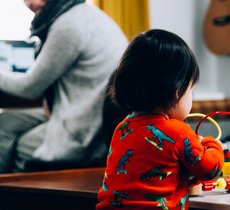 | On October 15th (from 10am to 4pm) and October 16th (from 10am to 2pm), the Equal Opportunity invites (future) mothers and father working in academia to participate in the PD session: »Work/Family-Life-Integration in Academia«. The two consecutive workshops are intended for Doctorate Candidates and Post-Docs and the tackle the question: »Having a career and children — how can it work?«
Participants will reflect on their own professional and life situations by means of biographical methods, integration models, target-means-analyses, as well as tools for resource-analysis and career-/life-planning. Through these exercises, they will also consider how the ambivalences and tensions between their professional and family lives emerge in and through social relations. Through concrete model-scenarios and models for communicating with executives and supervisors, participants will learn to be more self-confident in negotiations. The workshop will be taught by family-coach and supervisor Dr. Iris Koall as well as by researcher and educator Dr. Michael Tunç, who specializes in gender studies.
Dr. Iris Koall and Dr. Michael Tunç will teach the workshop in German. Depending on the pandemic situation, the number of participants will be limited to either 12 (online) or 15 people (offline).
If you’d like to register for the workshops, please send an email to: michael.wallner@remove-this.uni-weimar.de. Registration deadline is 15 September 2021. Foto: Francisco De Legarreta C. (@francisco_legarreta; unsplash.com)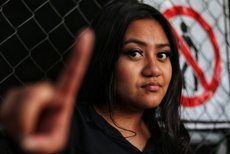 | Unfortunately, the issue of insensitive patriarchal behaviour has not been resolved yet. In a social structure that affects everybody on a daily basis and in very concrete ways, women, non-binary and female-socialized persons still need connections of empowerment and solidarity as well as practical possibilities for action in everyday (university) life.
With her 3-hour online workshop, Julia Lemmle wants to provide female and non-binary students of the Bauhaus-Universität Weimar with just such a space. Her workshop focuses on self-strengthening and resource activation. Participants will learn about empowerment tools for their own feminist group (of friends). Moreover, they will learn how to set effective boundaries and how to protect themselves in situations of assault — both verbal and non-verbal — through role-play-scenarios.
Julia Lemmle is a communication trainer, systemic coach and performer. She has been combining feminism, anti-racism, communication, embodiment, and cultural history in her work for more than 10 years.
Online-Workshop No. 1 (German):
Thursday, 11 Nov. 2021 | 9:30 am – 12:30 pm
Online-Workshop Nr. 2 (English):
Thursday, 11 Nov. 2021 | 2:00 pm – 5:00 pm
Limited capacity — to register, please email michael.wallner@remove-this.uni-weimar.de by 1 November 2021. Logo for the diversity audit »Vielfalt gestalten«. Design: Carmen Draxler.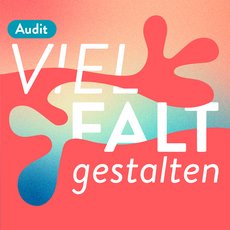 | On June 18th, 2021, the two-year diversity audit »Vielfalt gestalten« started at the Bauhaus-Universität Weimar with an introductory workshop. The goal of the audit of the German Stifterverband, in which the Bauhaus-Universität Weimar is to participate over the next two years, is to develop and implement a diversity strategy.
About 50 university members took part in the all-day online workshop. In four working groups, they discussed aspects of diversity in teaching and learning, staff selection, support services and management of complaints at the Bauhaus-Universität Weimar. Moreover, they developed first ideas for a diversity action plan. The next workshop is expected to take place in the fall. In the meantime, the working-groups are encouraged to delve deeper into these complex issues and to involve other interested members of the university in the process.
The working groups are still open to all members of the university, i.e., all students, teachers and staff are welcome to join and share their ideas at any stage of the process. If you would like to get involved and help us shape a more diverse and inclusive university, please contact Dr. Miriam Benteler (Diversity Officer) or the respective working group's contact people.
Here you can find a short report about the kick-off workshop. Logo of the »Charta der Vielfalt« (Source: Wikimedia Commons). | On June 18th, 2021, the Bauhaus-Universität Weimar used the introductory workshop of the »Vielfalt gestalten« (shaping diversity) audit as an opportunity to initiate its accession to the »Charta der Vielfalt« (Charter of Diversity). Before an online-audience of approximately 50 university members, President Prof. Dr. Winfried Speitkamp signed the certificate, which is now to be countersigned at the German Federal Chancellery by the Federal Government Commissioner for Migration, Refugees and Integration. The Bauhaus-Universität Weimar will thus become part of a network of currently 3.900 signatories who are committed to cultivating an inclusive and »appreciative work environment [for all] — irrespective of age, ethnic background and nationality, gender and gender identity, physical and mental abilities, religion and worldview, sexual orientation and social background.« One of the five double-sided posters from Carmen Draxler’s installation on gender-inclusive language. Photo: Carmen Draxler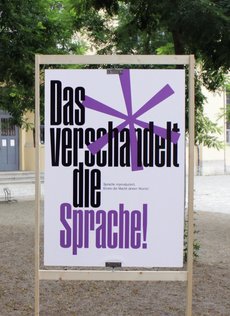 | During this year’s summaery, a poster installation by Carmen Draxler called attention to the topic of gender-inclusive language. Partly inspired by the Equal Opportunity Office’s language guide — »Changing Language Together« — Draxler's project dealt with issues of language, power, and representation. It featured five double-sided posters that spectators could spin around in their wooden frames. The posters’ front pages showed short, provocative slogans: either wide-spread prejudices against the use of gender-inclusive language (see picture) or common gender-stereotypes expressed in everyday language. The posters' flip-sides made the case for gender-inclusive language, explaining both its purpose and its strategies. The interactive posters were on display from 15 – 22 July, in the open space between the main building, M18, and the Campus.Office.
If you’d like to learn more about the Carmen Draxler's installation or the five posters she created, please click here. Illustration of the Bauhaus-Universität Weimar's campus for the introductory text in Simple Language. Design: Rosa Linke. 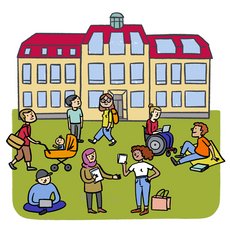 | In June 2021, University Communications made important information about the Bauhaus-Universität Weimar available in Simple Language: What is a university, and what is special about the Bauhaus-Universität Weimar? Who works and studies here, and how is the university organized? What is the history of the Bauhaus-Universität Weimar, and what are the Weimar Bauhaus Sites on the UNESCO's World Heritage List?
The Simple Language translation of parts of the university’s website was produced by the Büro für Leichte Sprache of the Lebenshilfe-Werk Weimar/Apolda e.V. Thanks to their help, people with cognitive or learning disabilities can now inform themselves about the Bauhaus-Universität Weimar. People with dementia and people who are learning German as a Second Language may also benefit from the distribution of information written in Simple Language.
Website users can access the information in Simple Language via the button »Accessibility« in the upper left corner of the university’s homepage. An additional subpage provides further information about the general characteristics of Simple Language: Simple Language uses short sentences, written in active voice, that express no more than one idea at once. It avoids loan words and technical terms or explains the underlying concepts and ideas, step by step, using plain language. Logo of the Federal Statistical Office. © Destatis.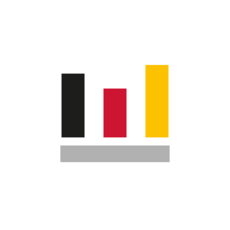 | In July 2021, the Federal Statistical Office (Destatis) reported an increase in post-doctoral lecturing qualifications (habilitations) obtained by women for the year 2020. That year, a total of 1,533 scientists completed their habilitations at German universities, which corresponds to an increase of 1 % compared to 2019. Of these 1,533 habilitations, 995 were completed by men (65 %) and 538 by women (35 %). While the number of post-doctoral lecturing qualifications obtained by men decreased by 4 % in 2020, the number of post-doctoral lecturing qualifications obtained by women increased by 11 %. From 2019 to 2020, the proportion of women completing habilitations increased by three percentage points (from 32 % to 35 %). In 2010, this proportion was 25%. Reiser, Marion; Küppers, Anne; Hebenstreit, Jörg; Salheiser, Axel & Vogel, Lars. (2021). »Politische Kultur im Freistaat Thüringen: Die Corona-Pandemie in Thüringen: Ergebnisse des Thüringen-Monitors 2020«. Jena: Friedrich-Schiller-Universität Jena, KomRex — Zentrum für Rechtsextremismusforschung, Demokratiebildung und gesellschaftliche Integration. 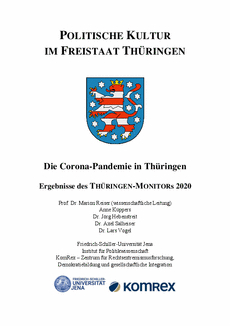 | Last April, the Thuringian State Chancellory released the findings of the Thüringen-Monitor 2020. The Thüringen-Monitor is a representative survey on the political climate in the Free State of Thuringia, which has been conducted annually since 2000. Every year, a special focus is placed on assessing the levels of right-wing extremist attitudes, acceptance of democracy, contentment with democracy, trust in institutions, and political participation among the Thuringian population.
The Thüringen-Monitor 2020 examined the political climate in Thuringia during the Corona pandemic. Encouragingly, compared to the previous year, the level of right-wing extremist attitudes has notably decreased in Thuringia in 2020. The researchers explain this decline by the circumstance that the topics of »migration« und »integration« had received less attention during the government and Corona crises. Moreover, the interviewees perceived neither the pandemic’s impact on their own lives nor the government’s handling of the situation as a distribution battle between their own group and outsiders. A source of concern is, however, the significant overlap the researchers found between the group of people with right-wing extremist attitudes and the group of people sceptical of the pandemic. This overlap, the scientists argue, poses a challenge for democracy in the times of pandemic.
Already in 2018, the Thüringen-Monitor had found a widespread distribution of right-wing extremist tendencies and negative attitudes towards asylum, migration, and diversity among the Thuringian population. In view of the findings of the study at that time, members of the Bauhaus-Universität Weimar founded the »Ad-hoc group to combat racism in higher education and society.« The group still meets on a regular basis: on every first Friday of the month. Ahmed, Sara. (2012). »On Being Included: Racism and Diversity in Institutional Life«. Durham, NC, USA: Duke UP.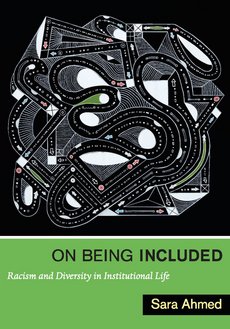 | What does diversity do? What are we doing when we use the language of diversity? Sara Ahmed offers an account of the diversity world based on interviews with diversity practitioners in higher education, as well as her own experience of doing diversity work.
Diversity is an ordinary, even unremarkable, feature of institutional life. Yet diversity practitioners often experience institutions as resistant to their work, as captured through their use of the metaphor of the »brick wall.« On Being Included offers an explanation of this apparent paradox. It explores the gap between symbolic commitments to diversity and the experience of those who embody diversity. Commitments to diversity are understood as »non-performatives« that do not bring about what they name.
The book provides an account of institutional whiteness and shows how racism can be obscured by the institutionalization of diversity. Diversity is used as evidence that institutions do not have a problem with racism. On Being Included offers a critique of what happens when diversity is offered as a solution. It also shows how diversity workers generate knowledge of institutions in attempting to transform them. Kühne, Fränzi. (2021). »Was Männer nie gefragt werden: Ich frage trotzdem mal«. Frankfurt/Main: Fischer.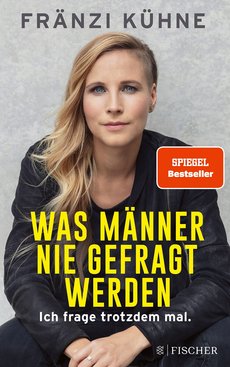 | »Mister Maas, you mostly wear suit and tie – that’s the standard in politics, isn’t it?«
»Did you have to decide between having children and your start-up, Mister Zeiler?«
Why do these questions sound so strange? — Because they are usually only posed to women. Author Fränzi Kühne experienced this first-hand, when she became Germany’s youngest supervisory board member of a publicly listed company. However, instead of just getting angry about it, she chose to turn the tables. In her book Was Männer nie gefragt werden: Ich frage trotzdem mal, she aks men all the questions she usually receives in interviews.
Kühne’s interview partners for the book are: Jürgen Bornschein, Axel Bosse, Jörg Eigendorf, Rainer Esser, Holger Friedrich, Gregor Gysi, Lars Hellmeyer, Joe Kaeser, Friedrich Kautz, Fynn Kliemann, Frater Rafael Maria Klose, Heiko Maas, Christoph Mönnikes, Julian Otto a.k.a. Bausa, Christian Rach, Frank Thelen, Helmut Thoma, Ole von Beust, Jean-Remy von Matt, Frank-Peter Weiß, Peter Wittkamp, and Waldemar Zeiler.
Fränzi Kühne, born in 1983 in East-Berlin, is a supervisory board member, mother, author, trained negotiator, as well as founder and long-time executive director of Germany’s first social media agency. Cover of the University of Toronto's online-resource: »Your Journey: A Career Guide for Trans and Nonbinary Students«. © University of Toronto.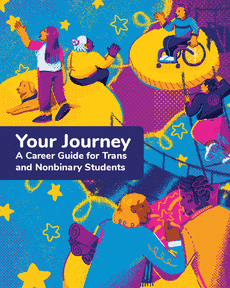 | Cover of the online-resource: »Transitioning Employers: A Survey of Policies and Practices for Trans Inclusive Workplaces«. © Institute for Gender and the Economy & Pride at Work Canada.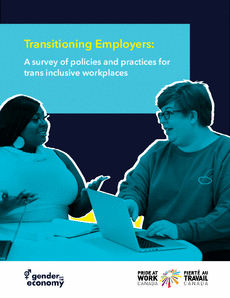 | On Thursday, February 18, 2021, the University of Toronto hosted an online panel discussion titled »More Than Pronouns: A Dialogue on Trans-Inclusion in the Workplace«.
This dialogue on trans and nonbinary inclusion in the workplace addressed questions, challenges and complications in the search for employment. The three speakers shared practical suggestions, strategies and resources which can support trans and nonbinary students and alumni in their career development, as well as equip employers and HR professionals with actionable steps towards building a more inclusive workplace.
You can watch a video-recording of the panel discussion on the website of the University of Toronto’s Sexual & Gender Diversity Office (SGDO).
The discussion also introduces two recently developed online/print resources for trans and non-binary inclusion in the workplace:
Pereira, David, Sania Hameed, Mary Stefanidis and Allison Burgess (2020). »Your Journey: A Career Guide for Trans and Nonbinary Students«, a joint publication from Career Exploration & Education and the Sexual & Gender Diversity Office. Toronto, ON: University of Toronto.
Fosbrook, Bretton, Sarah Kaplan and Jade Pichette (2020), »Transitioning Employers: A Survey of Policies and Practices for Trans Inclusive Workplaces«, a joint report from the Institute for Gender and the Economy and Pride at Work Canada. [The report is also available in French] Film poster: »Picture a Scientist« 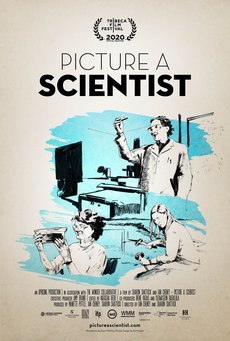 | »Picture a Scientist« chronicles the groundswell of researchers who are writing a new chapter for women scientists. Biologist Nancy Hopkins, chemist Raychelle Burks, and geologist Jane Willenbring lead viewers on a journey deep into their own experiences in the sciences, ranging from brutal harassment to years of subtle slights. Along the way, from cramped laboratories to spectacular field stations, we encounter scientific luminaries—including social scientists, neuroscientists, and psychologists—who provide new perspectives on how to make science itself more diverse, equitable, and open to all.
Here is a trailer for the movie.
Here you can stream the movie (at a cost). Foto: C D-X (@cdx2; unsplash.com) | A lot of research potential is still being wasted because too few highly-qualified women work in the STEM sciences. In the new EDITION-F podcast »LAB GAP«, Victoria Müller shines a light on the structures responsible for this lack of female STEM scientists. Speaking to leading scientists in their laboratories, space stations, and research vessels, Müller makes women in STEM visible. Her podcast features: an astronaut, one of Germany’s top 25 engineers, an expert on artificial intelligence and robotics, a scientist specializing in research without animal testing, a polar explorer — and many more!
Here you can find a (German-language) interview with Victoria Müller.
Here you can find the (German-language) podcast »LAB GAP«. Hanna pursuing her short-term contract work. © BMBF.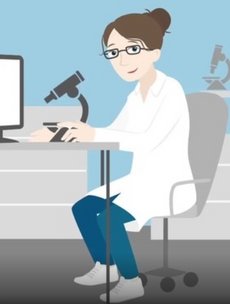 | On its website, the Federal Ministry of Education and Research (BMBF) posted a (since removed) video explaining the purview of the Academic Fixed-Term Contracts Act (Wissenschaftszeitvertragsgesetz, WissZeitVG), a law causing particularly PhD candidates and post-docs to rely on fixed-term contracts. According to the BMBF’s video, the purpose of these fix-term contracts is to ensure that junior scientists don’t »clog the system«. In response, the video’s protagonist, Hanna, was appropriated as the face of a social media campaign mocking the BMBF’s video and protesting the law and its consequences. On Instagram and Twitter, scientists, journalists, politicians and others are criticizing the precarious work-conditions experienced by junior scientists in the German academic system. Besides insecure working conditions, short contract periods, and a lack of planning reliability, the social media campaign also calls out the low appreciation of teaching and committee work as well as the exclusionary character of German academia with respect to diversity. You can get a good overview of the debate through the following blog: https://ichbinhanna.wordpress.com/english-version/.
How can the academic system become more just? We would love to hear your thoughts: gleichstellungsbuero@remove-this.uni-weimar.de.
|
|
|
|























